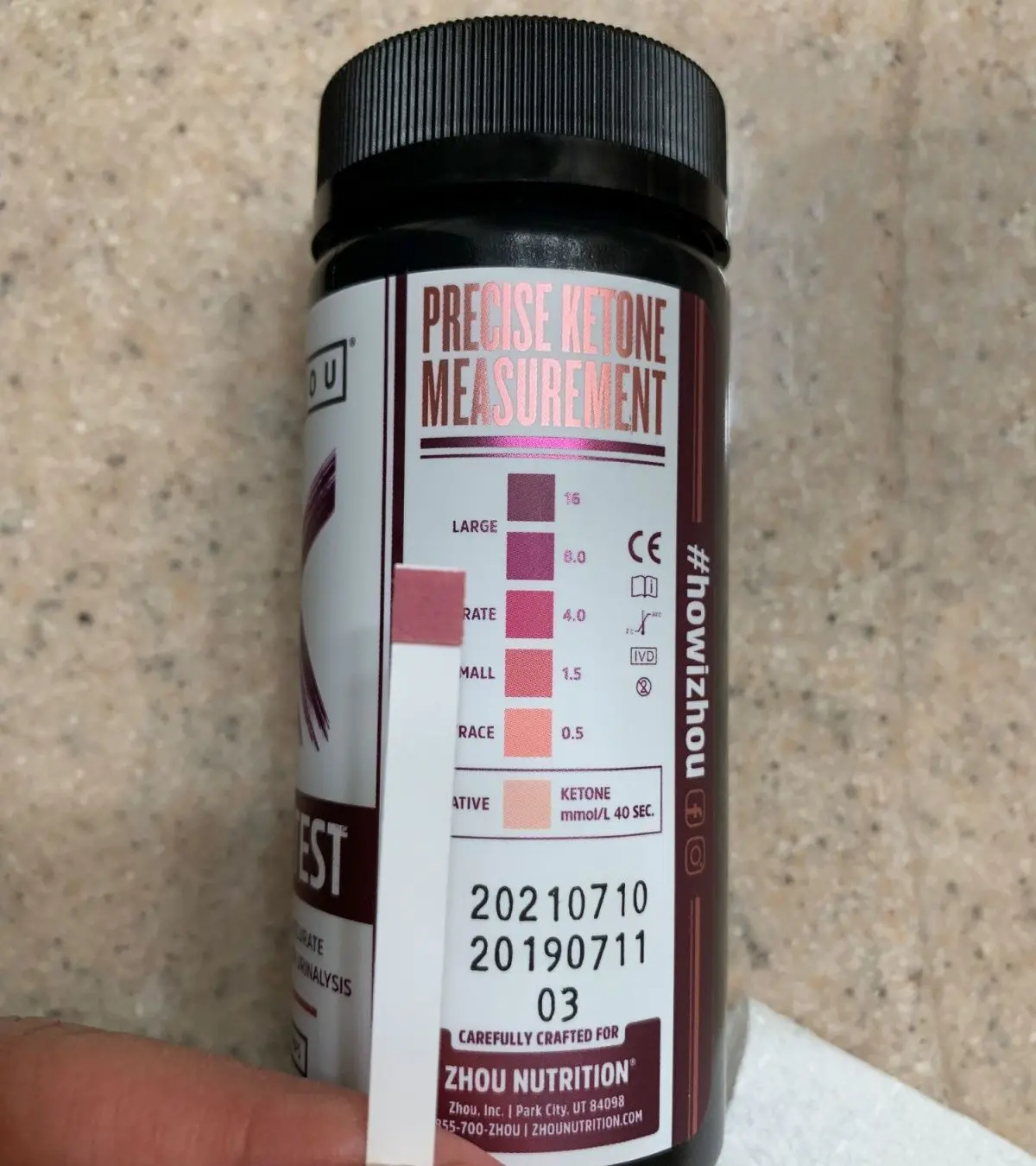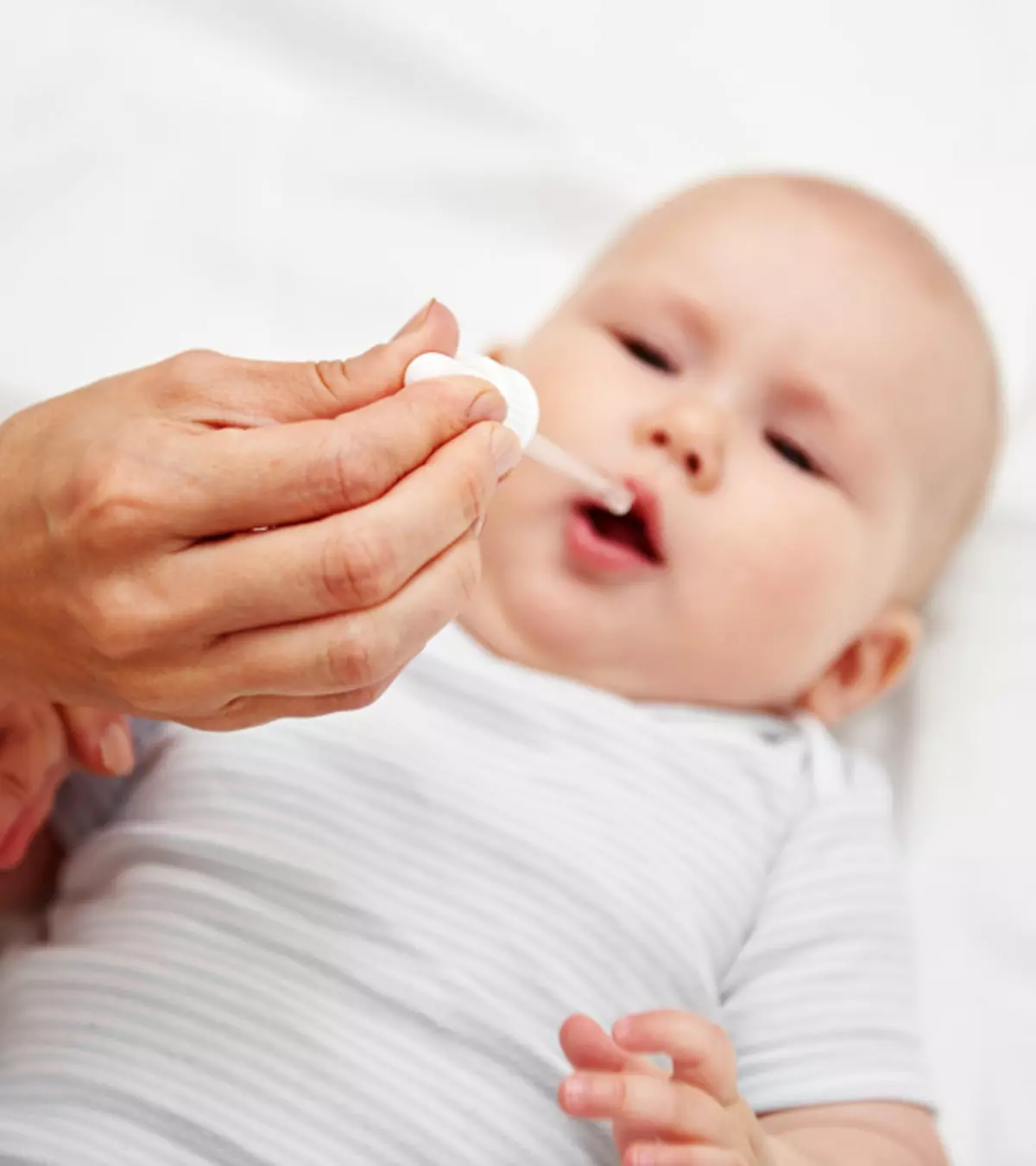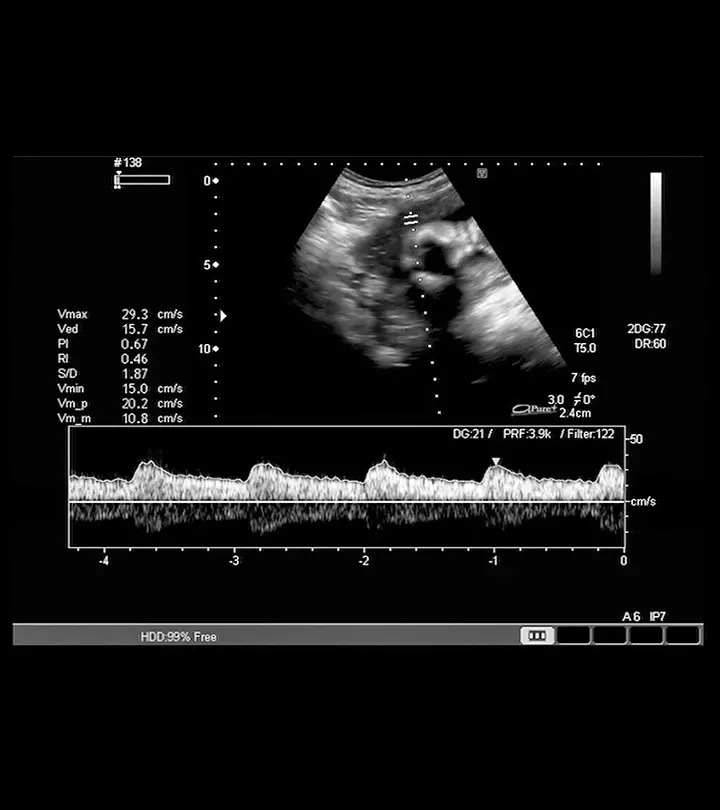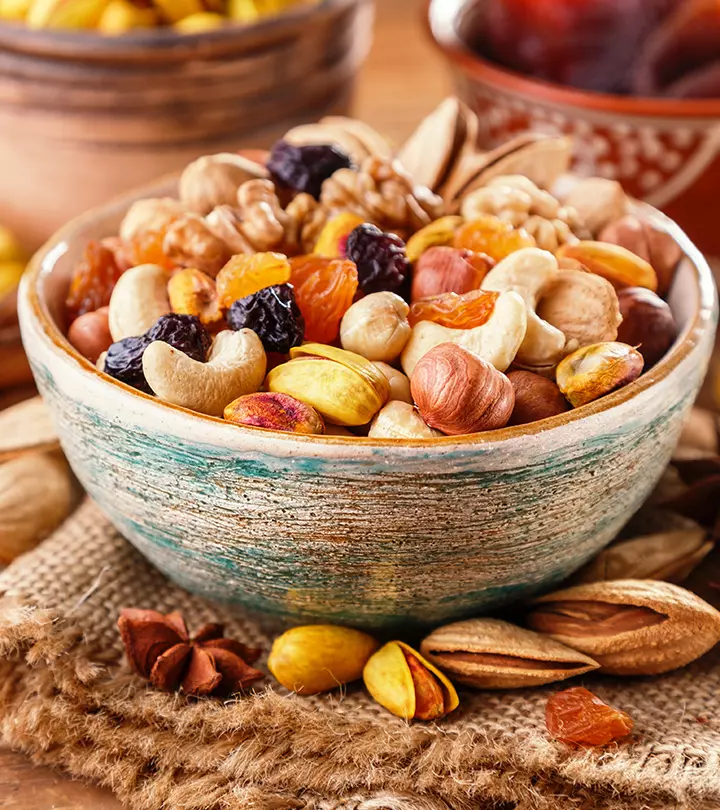
Image: Shutterstock

The body experiences several changes during pregnancy. Women can experience changes in hemoglobin levels during pregnancy, with an increase in the hemoglobin circulating in the body. The overall hemoglobin concentration drops, though.
Hemoglobin, found in the red blood cells (RBCs), transports oxygen from the lungs to other body parts (1) (2). The oxygen requirement of the baby is also met through maternal blood. Many pregnant women are at risk of anemia in the second trimester when the hemoglobin and hematocrit levels are lowest. According to the World Health Organization (WHO), anemia affects approximately 37% of pregnant women. Therefore, healthcare providers may check maternal hemoglobin levels during prenatal visits and recommend ways to minimize the risk of anemia.
Read on to learn how to increase hemoglobin in pregnancy.
Key Pointers
- The ideal hemoglobin levels for pregnant women should be around 10.5 to 13g/dl; otherwise, it could result in preterm birth.
- Consuming iron-rich foods, fruits, vegetables, medications, and vitamins can help improve hemoglobin levels.
- Paleness, fatigue, persistent headache, or uneven heartbeat may indicate the time to visit the doctor.
Ideal Hemoglobin Levels During Pregnancy
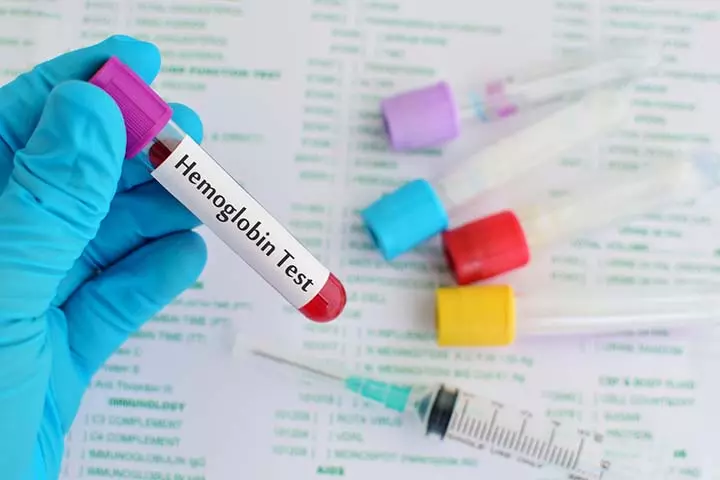
Image: Shutterstock
According to the World Health Organization, the hemoglobin levels in pregnant women should be more than 11g/dl in the first and third trimesters, and more than 10.5g/dl in the second trimester (2). Low levels of hemoglobin during pregnancy are likely to be associated with low birth weight and preterm birth.
Excessively high hemoglobin could also pose risks, and may not necessarily mean good iron levels, according to research. Therefore, proper care should be taken to maintain the ideal hemoglobin level during pregnancy.
The graph below represents the effect of frequent (red line) and infrequent (blue line) use of iron supplements on hemoglobin (Hb) levels throughout pregnancy.
As per the graph, both groups of women exhibit a comparable decline in Hb levels until the 24th week of pregnancy. However, around the 30th week, women with frequent iron supplement use showed higher Hb levels and reached higher Hb at delivery than women with infrequent use. Consequently, women with irregular iron supplement use may have a greater likelihood of postpartum anemia.

Hemoglobin levels among pregnant women with frequent and infrequent use of iron supplements
Source: Prediction of anemia at delivery; Scientific Reports-NaturePossible Ways To Increase Hemoglobin Levels During Pregnancy
Here is what you could do to support hemoglobin synthesis in your body during pregnancy.
- Iron-rich foods in the diet: If your hemoglobin is just below the ideal levels, increase the intake of foods that are rich in iron. During pregnancy, you need 27mg of iron a day (3). To meet that requirement, you may consider including the following foods in your diet (4):
a. Vegetables and fruits: Spinach, parsley, Brussels sprouts, turnips, peas, broccoli, kale, asparagus, cabbage, green peppers, and tomatoes are some sources of iron in vegetables. In fruits, you may eat oranges, apples, apricots, and figs.
b. Dry fruits: Raisins, peanuts, almonds, dates, dry figs, and hazelnuts are good sources of iron.
, a Winona-based board-certified obstetrician/gynecologist, says, “Dates are a great snack because they are also rich in iron and other good minerals, making them a smart choice to eat during pregnancy. Additionally, prunes are high in iron and fiber, which can help regulate digestion and promote healthy hemoglobin levels. However, it’s important to note that eating iron-rich foods doesn’t guarantee a significant increase in hemoglobin levels. If you have personal concerns, you should speak with your healthcare provider to determine the best course of action.”
c. Grains, cereals, and bread: Wheat germ, wheat, buckwheat, millet, barley, oats, and cereals and bread fortified with iron might help.
 Caution
CautionYou can consume all types of liver, except fish liver, during pregnancy as a rich source of iron; however, limit your intake to once per week (16).
d. Poultry and seafood: Eggs, chicken, liver, pork, beef, lamb, and seafood such as oysters, sardines, clams, tuna, and shrimp, are good choices.
e. Others: Some other foods that could help you improve hemoglobin levels are coconut, peanut butter, chocolate, and nettle tea (5).
- Foods rich in vitamin C: Consuming vitamin C during pregnancy is essential to support different body functions. For instance, vitamin C can help absorb iron from food, which can increase hemoglobin production in the body (6). Some good sources of vitamin C that you can include in your diet include cauliflower, green pepper, cantaloupe, strawberries, kiwifruit, tomato juice, and potatoes (7).

Image: Shutterstock
- Foods not to have along with supplements: Do not take iron blockers along with iron supplements, as they may hinder iron absorption. You may take them after some gap. A few such foods are cheese, yogurt, ice cream, milk, tea, coffee, and alcohol (8).
- Medications and supplements: Doctors usually prescribe iron supplements based on your hemoglobin count, your dietary plan, and the trimester you are in. Taking the prescribed dosage of supplements could help in preventing the risk of antepartum and postpartum anemia (9).
 Point to consider
Point to considerTake the iron tablet with a small amount of food if it disturbs your stomach. Never take these tablets with dairy or calcium supplements (16).
- Oral or intravenous: Iron supplements can be oral but if the woman is unable to tolerate oral iron, she may be administered intravenously.
- Intake of vitamins: It is also important to take vitamins such as vitamin B12 as iron deficiency can mask the deficiency of vitamins. The safest way to maintain a healthy hemoglobin level is to follow a healthy diet throughout the pregnancy. See that you are getting proper nourishment from the foods you eat. Also, get your hemoglobin levels checked during regular doctor visits to ensure they remain within the normal range.
 Quick tip
Quick tipYou may take prenatal multivitamin and mineral supplements that contain more folate to increase your hemoglobin level during pregnancy (16).
When To Visit The Doctor?
Low hemoglobin levels may also cause the following signs and symptoms that might need a doctor’s visit.
- Pale gums and skin
- Muscle weakness and fatigue
- Frequent headaches
- Irregular heartbeat
- Difficulty in concentration
- Labored breathing (10)

Image: Shutterstock
Frequently Asked Questions
1. What is the normal hemoglobin level for a pregnant woman?
The normal hemoglobin levels during pregnancy can range from 11.5 – 13.5g/dl. A hemoglobin level below 11g/dl is considered anemia in pregnancy and may require treatment (11).
2. What foods to avoid if you have low hemoglobin?
You may avoid drinks and foods that can reduce iron absorption in the body. Soy proteins and whole grains are plant-based foods that reduce iron absorption. Tannins in coffee, tea, and wine also interfere with iron absorption by the intestines (12). You may consult a dietician for a balanced diet plan, so you do not miss out on any essential nutrients.
3. What can I drink to increase hemoglobin?
Certain foods and drinks can help to enhance iron absorption in the body. Consuming vitamin C-rich foods, such as citrus fruits, boosts iron absorption. Cooking plant-based iron-rich food can increase the availability of non-heme iron than consuming it in raw forms. Animal proteins, such as lean meat, also contain iron (12).
4. What are the symptoms of low hemoglobin?
A low hemoglobin level can result in oxygen deprivation in the body since hemoglobin carries oxygen to tissues. It may make you feel tired, dizzy, and sluggish. Headache, pale skin, cold hands and feet, and breathing problems can also be experienced due to low hemoglobin levels (13). If you experience these symptoms, consult your doctor about a hemoglobin test.
5. What is the normal hemoglobin level for pregnant women in the second trimester?
10.5g/dl is the normal hemoglobin level in the second trimester. This can be slightly lower than the hemoglobin level in the first and third trimesters. Usually, women of childbearing age have 12 to 16g/dl hemoglobin levels (14).
6. At what level is hemoglobin dangerously low?
Hemoglobin level below 5.0 g/dL (50 g/L) is considered dangerously low. This may lead to heart failure and life-threatening conditions if not corrected promptly. Usually, it may take six to twelve weeks with adequate prenatal care to return to normal hemoglobin levels if it reduces to dangerously low levels (15).
It is essential to maintain optimal hemoglobin levels during pregnancy since low levels can increase the risk of low birth weight and preterm delivery. Taking iron supplements and iron-rich foods can help maintain the required hemoglobin levels in pregnancy. You could also consume vitamin C since it increases the absorption of iron. Also, avoid foods that interfere with iron absorption. Symptoms such as frequent headaches, pale skin, tiredness, labored breathing, or irregular heartbeat may indicate low hemoglobin levels. Stay attentive to these signs and seek prompt medical attention to manage the condition and prevent adverse outcomes.
Infographic: Effects Of High Hemoglobin Levels In Pregnancy
During pregnancy, you will need iron supplements as advised by the doctor to meet the fetal oxygen needs. In some cases, the hemoglobin levels may arise from the lungs, kidneys, and heart conditions. These increased levels are not suitable for pregnancy. Check out this infographic that lists the outcomes of high hemoglobin levels when pregnant. Illustration: Momjunction Design Team
Illustration: Ways To Increase Hemoglobin Levels During Pregnancy

Image: Dall·E/MomJunction Design Team
References
1. Anemia; U.S. Department of Health and Human Services National Institutes of Health (2016)
2. F. M. Tabrizi and S. Barjasteh; Maternal Hemoglobin Levels during Pregnancy and their Association with Birth Weight of Neonates; Iranian Journal of Pediatric Hematology Oncology (2015)
3. Iron Fact Sheet for Consumers; National Institutes of Health
4. Iron; National Institutes for Health
5. Iron in Nettle Tea; Health with food
6. What is iron deficiency?; Intermountain healthcare
7. Vitamin C Fact Sheet for Health Professionals; National Institutes for Health
8. Iron Inhibitors & Promoters; Iron Disorders Institute
9. Guideline: Daily iron and folic acid supplementation in pregnant women;
10. Anemia in Pregnancy; Stanford Children’s Health
11. The critical hemoglobin/hematocrit value in obstetrics; National Library of Medicine
12. Iron And Iron Deficiency; BetterHealth Channel
13. Avoiding Anemia; National Institutes for Health
14. Masoomeh Goodarzi Khoigani, et al; The relationship of hemoglobin and hematocrit in the first and second half of pregnancy with pregnancy outcome; National Library of Medicine (2012)
15. Note on Hemoglobin and Its Importance; International Journal of Collaborative Research on Internal Medicine & Public Health
16. Anemia and Pregnancy; University of California San Francisco
Community Experiences
Join the conversation and become a part of our nurturing community! Share your stories, experiences, and insights to connect with fellow parents.
Read full bio of Dr. Sangeeta Agrawal
- Dr. Michael Green is a board-certified OB/GYN living in Lake Arrowhead, CA. He studied medicine at St. Louis University of Medicine and completed a Family Medicine Residency at the Ventura County Medical Center. Dr. Green did a second residency in Obstetrics and Gynecology at The Carolinas Medical Center in Charlotte, NC. In addition, he holds a masters degree in Chemistry from the California State University Northridge. With over 17 years experience, Dr. Green currently works as a site director for OBHG at Northridge Medical Center in Northridge, CA.
 Dr. Michael Green is a board-certified OB/GYN living in Lake Arrowhead, CA. He studied medicine at St. Louis University of Medicine and completed a Family Medicine Residency at the Ventura County Medical Center. Dr. Green did a second residency in Obstetrics and Gynecology at The Carolinas Medical Center in Charlotte, NC. In addition, he holds a masters degree in Chemistry from the California State University Northridge. With over 17 years experience, Dr. Green currently works as a site director for OBHG at Northridge Medical Center in Northridge, CA.
Dr. Michael Green is a board-certified OB/GYN living in Lake Arrowhead, CA. He studied medicine at St. Louis University of Medicine and completed a Family Medicine Residency at the Ventura County Medical Center. Dr. Green did a second residency in Obstetrics and Gynecology at The Carolinas Medical Center in Charlotte, NC. In addition, he holds a masters degree in Chemistry from the California State University Northridge. With over 17 years experience, Dr. Green currently works as a site director for OBHG at Northridge Medical Center in Northridge, CA.
Read full bio of Dr Bisny T. Joseph
Read full bio of Rebecca Malachi
Read full bio of Reshmi Das







